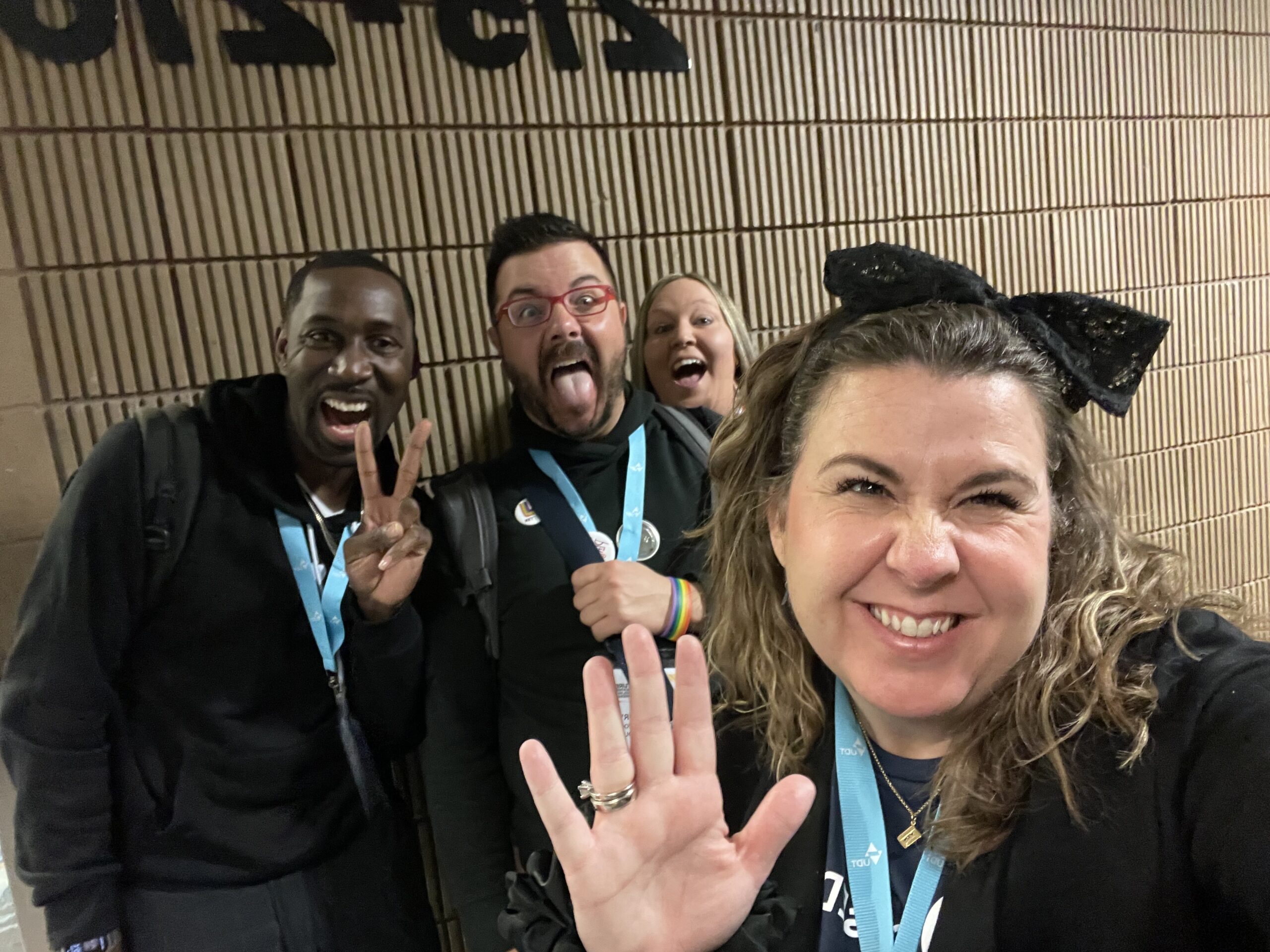Ep. 11 | The Importance of Play in the Classroom
Welcome to the Growth Over Grades Podcast where we talk about education ideas and topics that matter most to our SpacesEDU Educator Community. At the beginning of each new episode, I like to feature an amazing educator in our community. This week, I want to give a shoutout to Amy Storer. Amy is an active member in our professional learning network (PLN) and is always sharing innovative ideas. She supports so many educators all over the world and encourages them to develop stronger relationships with students while helping them learn how edtech can help make it more fun and natural. She is also the reason I started following our guest, Jed Dearybury.

Jed Dearyburty, Amy Storer, Dr. Mason Mason, and Melody McAllister at FETC in January 2023.
Meet Jed Dearybury
Jed is an educator who has taught early child elementary and post-secondary education in training future educators. He models culturally responsive teaching while infusing his lessons with play and has co-authored two books focused on play, The Playful Classroom and The Playful Life. And he doesn’t just teach this, but lives it, too. I had the honor of meeting Jed at the Teach Better Conference this past fall and was able to see his support of educators with my own eyes.
Jed Dearybury is a joy to be around and if you are not already following him, make sure to start today! As a member of the LGBTQIAplus community, Jed is also vocal and a leader in ensuring teachers and students are represented, especially those who have been historically marginalized in our schools and society. He has also co-authored a book called The Courageous Classroom and shares the importance of creating a safe space for his students.
Play Is For All Ages
Do you think play gets a bad rap in schools? Do the kindergarten classrooms in your district still have toy kitchens or art easels? It has been regular practice in the last decade to do away with these kinds of toys so teachers and students can focus more on standards.
But is play really helpful? It’s probably obvious that the answer is that science supports play. Some educators and leaders wrongfully believe that play is only for preschool or is not rigorous. However, gamification of content is on the rise because it’s highly engaging.
In this episode, Jed talks about the neuroscience behind play and how it helps learning stick by creating emotional experiences. What is a student more likely to remember, content taught through lecture or a worksheet or content explored through play? He also shares about neuroplasticity and how play keeps our brains evolving, and the added benefits of the release of serotonin during the learning (or life) experiences.
“When you have a playful experience, you are also having an emotional connection to what you are doing. So the learning sticks, whether it’s learning from a book, or teacher, or an experience in the real world….The more we as educators embrace that, the more we will see our students connecting with the work and it will become much more meaningful and relevant.” Jed Dearybury
Jed shared that quote when he was talking about a former student who had just recently reached out to him. She remembered so much about how he inspired her as a student, but he also remembered her.
Check out the SpacesEDU Library of Lesson Plans
Implementing More Play: Look For Nooks & Crannies
If you are hoping to add more play in your lessons or life, Jed shares that we must start the day with intention. For him, he shares how he keeps a Golden Girls calendar and other GG memorabilia to get his day going in that direction. He also likes to read positive quotes and stories.
Jed Dearybury at the FETC SpacesEDU Booth shares a game he made up and uses with students and adults called Pig, Porg, Person. It’s silly but has many applications with life and curriculum.
Jed suggests starting small and looking for the “nooks and crannies.” We can start small, like during transition periods for special classes, lunch, or even dismissal. If we find something fun to do to interact with our students, we’ll start finding more ways to implement play in our content and curriculum, too. He even jokes that if we implement a playful attendance procedure, we’ll probably get fewer calls from the office for forgetting to do it!
Finding more playful moments can start small, be personalized to your students in your school, and isn’t as hard as we think it might be. When you find success in this area, share it with your fellow teachers and Professional Learning Network (PLN). We can learn so much from each other and inspire one another in this area and more.
When you find success in implementing more moments of play, please share on the socials and tag Jed, Melody, and SpacesEDU. We want to hear your ideas and be even more inspired. Thank you so much for learning more about this Growth Over Grades episode. If you are not already part of our Facebook or Twitter Communities, please join today!
Growth Over Grades Twitter Community
A Tribute for Biscuit
The day before Jed joined me on this podcast, he lost his companion, Biscuit. Biscuit is deeply loved by Jed and his husband. We dedicate this podcast episode to the loving memory of a faithful friend.

Follows & Show Notes:
Learn more about Jed Dearybury’s work on his website
Follow Jed on Twitter
Follow Jed on Instagram

